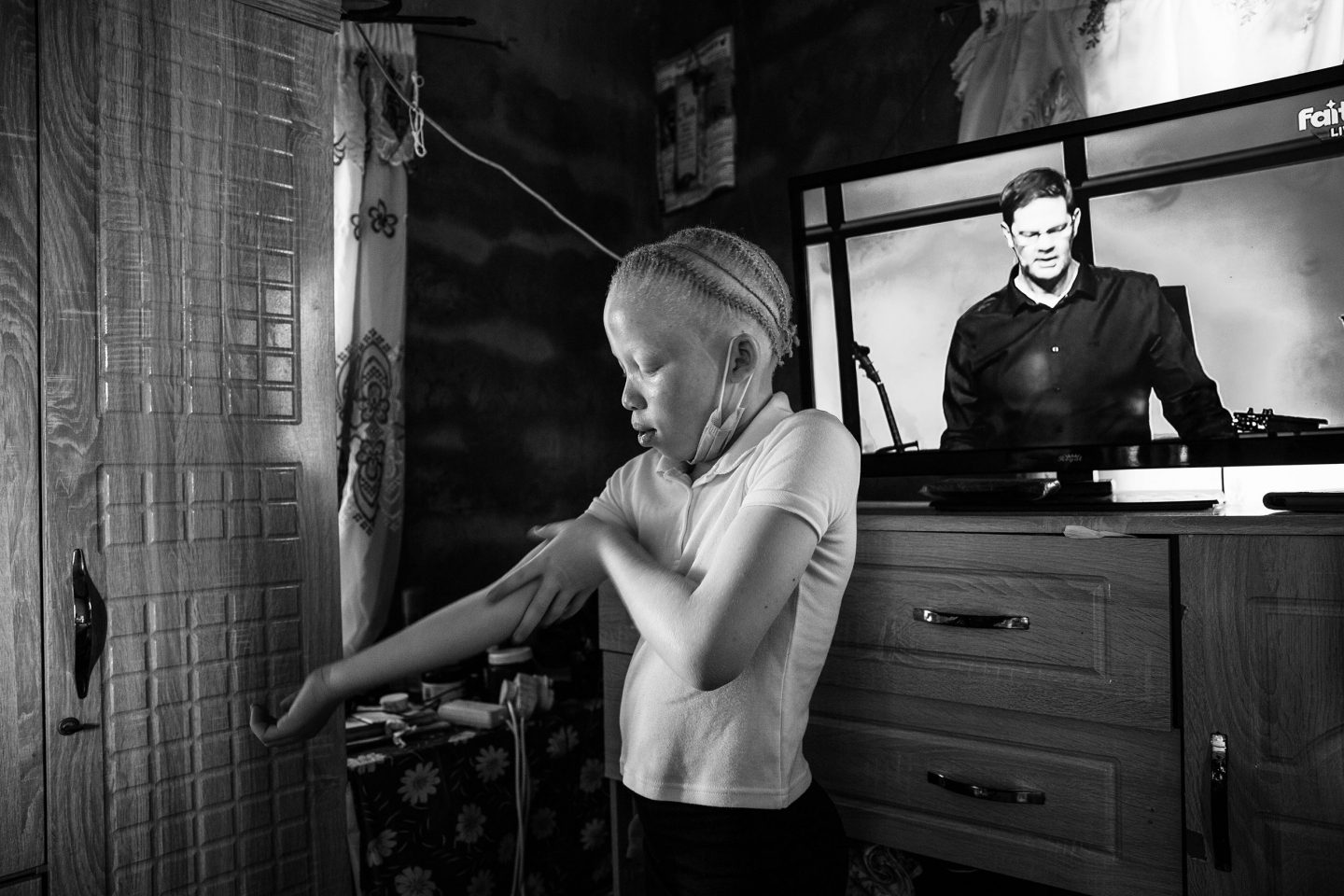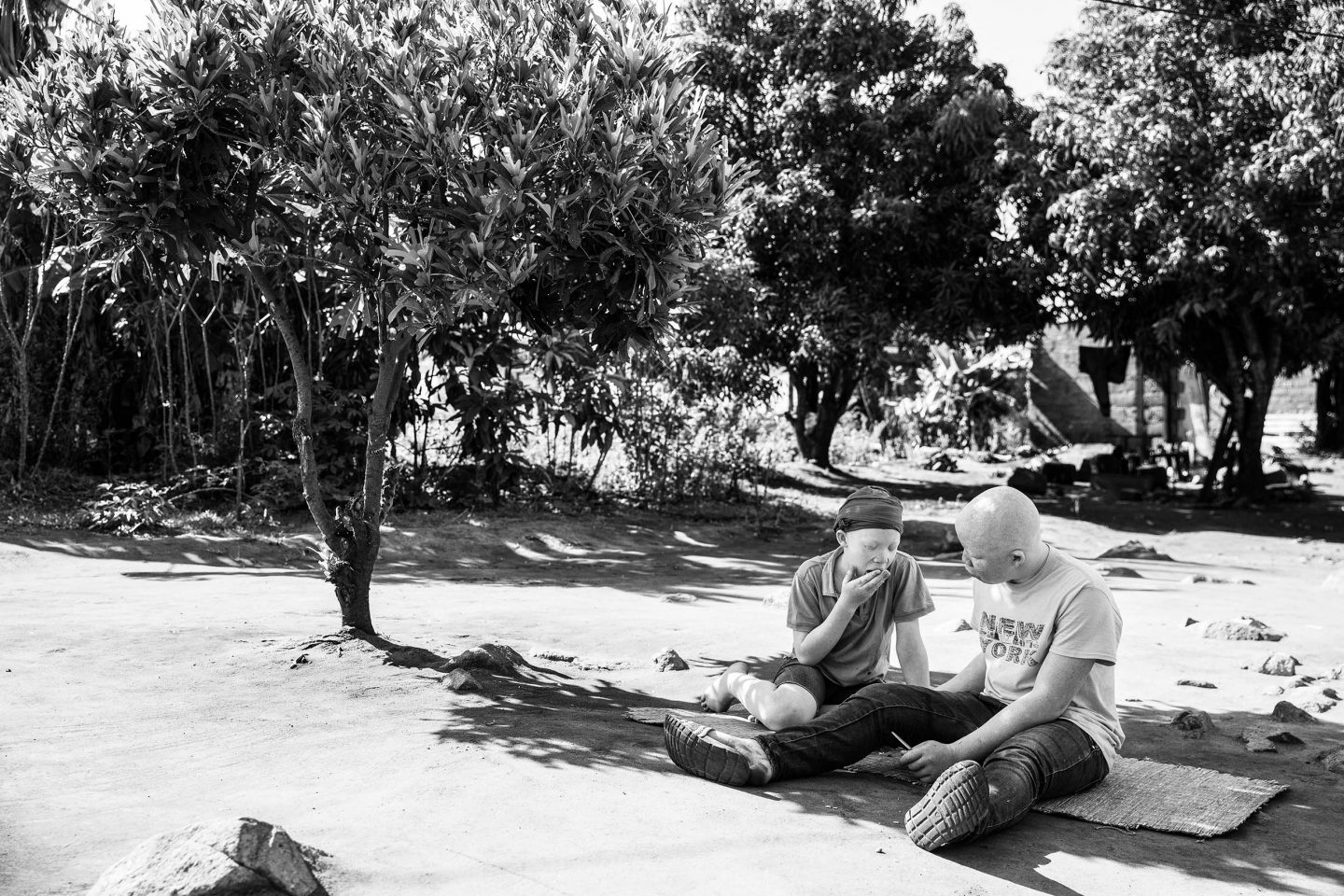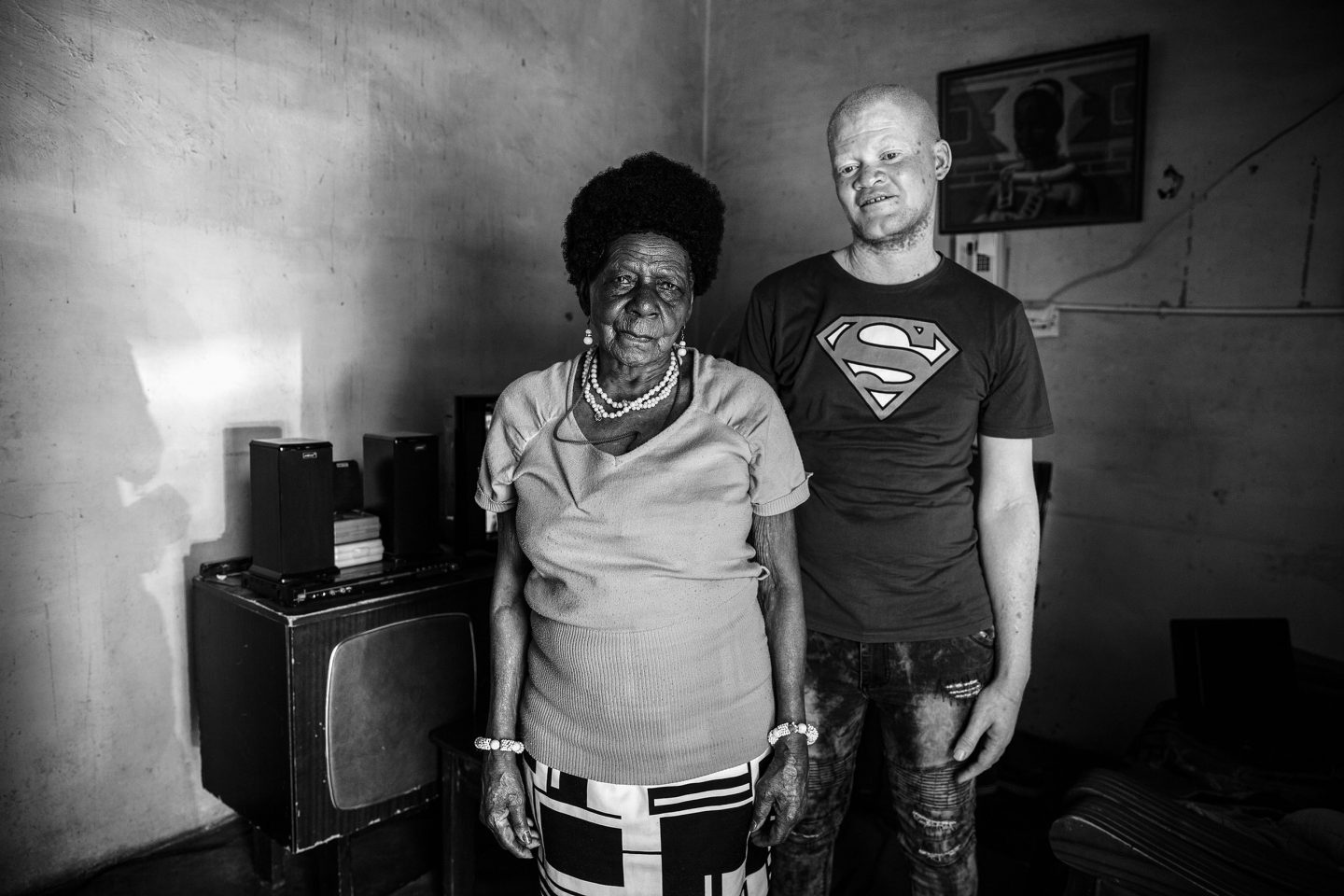Hiding from the sun, the stares and the killers
The albinism community remains marginalised, vulnerable and exploited, yet little is being done to protect them from human rights abuses.
Author:
19 January 2021

Sitting on the bed in the room he shares with his mother and younger sister, Nsikelelo Mamba, 16, has to squint to better watch a programme on the television less than a metre in front of him. His sister, Samkelisiwe, 12, doesn’t have to squint quite as much, but her eyesight isn’t perfect either.
The siblings have been spending most days over the past few months watching educational television and listening to educational radio programmes in an attempt to keep up their schooling.
Since joining their mother in Nkomazi, in northeastern Mpumalanga, Nsikelelo and Samkelisiwe have not been able to go to school. The Covid-19 lockdown has made it near impossible for their mother to find them a place in a school in the area.

Instead, the children mostly spend their time in the small room the three of them rent, hoping the educational programmes will ensure they don’t fall too far behind in their schoolwork. Nsikelelo was frustrated by their ongoing lack of school attendance. “I miss school. I really like mathematics.” He hopes to become a doctor or a maths teacher one day.
Their mother, Enough Sihlongonyane, has been living in South African since 2014, after she left her family and the father of her children behind in eSwatini to move to South Africa for “a better life”.
Related article:
“I didn’t want to stay with my parents. I wanted to stand on my own feet,” she said, sitting in the shade outside the brick room where they live. “At home, I stayed with my parents and I wasn’t working. So my parents would suffer. So that is why I decided to strike out on my own and see how it will be.”
Sihlongonyane has not been able to find full-time work in Nkomazi. Instead, she does piece jobs, like washing a neighbour’s clothes or cleaning for people in the area. While the rent for the room is R350 per month, she said she made around R50 a day if she did cleaning work.
Nsikelelo and Samkelisiwe initially stayed behind in eSwatini while their mother tried to find her feet in a new country. She always planned on having the children join her, but with the arrival of the coronavirus pandemic they joined her sooner than she had planned.

Both children were born with albinism. Sihlongonyane said she wasn’t aware of anyone in her family with albinism and was surprised when both her children were born with the condition.
Albinism, a congenital condition characterised by the complete or partial absence of pigment in the skin, hair and eyes, often leads to visual impairments such as photophobia (light sensitivity), nystagmus (involuntary eye movement) and amblyopia (a vision development disorder in which an eye fails to achieve normal visual acuity).
Marginalised and vulnerable
In South Africa, people with albinism are among the country’s most marginalised and vulnerable citizens, yet little attention is paid to protecting them from human rights abuses. Until recently, albinism has not been seen as a disability, but calls from the albinism community are growing for it to be classified as such.
It is a contentious issue, but Nomasonto Mazibuko, the founder and national director of the Albinism Society of South Africa who herself has albinism, said: “I was born without pigmentation, so we are treated as disabled because of our skin and being sensitive to the sun. Because our hair, our eyes and our skin lacks melanin, that is limiting. We cannot be in the sun and we have certain limitations because of the visual impairments,” she said.
Related article:
Mazibuko said the Office of the United Nations High Commissioner for Human Rights has taken steps to provide better support for people living with albinism. This includes some European countries regarding people with albinism as legally blind, which gives them the same rights as other people with disabilities.
“It is not a one size fits all, because our ability in vision is not the same. Some of us can be considered blind, some of us have a little bit of vision. So you will find some who will say, ‘No, we are not disabled,’ but we cannot sit in the sun, we cannot work in the field, and it is especially difficult in the rural areas near the borders,” she said.

Oupa Zitha, the chairperson of the Ehlanzeni Disability Forum, who knows Sihlongonyane and her children well, said the forum regarded people with albinism as disabled because of the visual impairments and skin conditions that often accompany it.
Sihlongonyane said: “They have problems with their eyes. [One of Nsikelelo’s] eyes does not work. Their eyesight is not good. And skin problems, there are so many.” It is important for her children to use sunscreen, but she cannot afford to buy it.
Other than visual impairments and skin problems, Sihlongonyane said stigma in the community and the prying eyes of others often bother her more than anything else. “The problem that we have is the neighbours and old people. They stare at them. We once heard one of the adults say, ‘There’s the money,’ referring to the perceived value of people with albinism’s body parts for use in potions by discredited traditional healers.
“To me, it’s a bad thing,” Sihlongonyane said. “But I am here in South Africa, so I can’t say anything. If I do, they will say, ‘It’s our country, we can say anything, you can’t judge us.’ It hurt a lot, but I had to be quiet.”

Welcome reprieve
Because of the stares and unwanted comments, the children hardly venture outside of the room they live in. One of the places where they’re not stared at and where Sihlongonyane feels it’s safe to take them is the Emmanuel Assembly Church, which is within walking distance of their home.
Here, on a recent Sunday, the children found a seat at the front of the church while Sihlongonyane and other women in the congregation stood at the back. During the service, she broke down in tears while her two children sat at the front oblivious to their mother’s moments of emotion.

There have been reports in South Africa and a number of other African countries, including Tanzania, Malawi and eSwatini, of people with albinism being murdered for their body parts, to be used in witchcraft rituals. Amnesty International found in a 2016 report that stereotypical beliefs that their body parts bring wealth and good luck fuel attacks on people with albinism.
Mkhulu Zama Ndebele, a traditional healer and the deputy chairperson of Buyisa, a council of traditional healers in Alexandra, Johannesburg, described this as a “dangerous myth”. He called those who commit such criminal acts “witches” and said they do not represent what traditional healers stand for. “Quite honestly, people with albinism are being victimised,” he said. “What they do is commit murder. It is the murder of innocent people.”

Mazibuko said it was a fear for any person with albinism to be murdered for their body parts, but it was part of the mandate of her society to educate people on these myths. “It is critical for us to demystify beliefs around albinism, and we cannot stop to educate, educate, educate.”
Sihlongonyane said reports of such murders make her extra cautious with her children. “I leave them here at the house because people stare. I leave them behind because of the sun, they can get badly sunburnt. And when I go to the shops with them, it is like I am marketing my kids to these sangomas, you understand? It happened a lot in eSwatini and even here you hear stories,” she explained, with her children sitting on a mat close by.

“Because I know it has happened before, that is why I am afraid. They are also scared, especially the older one. He is aware of what’s happening.”
Nsikelelo and Samkelisiwe are both shy and soft-spoken, but Sihlongonyane said Nsikelelo is extremely protective of his younger sister. “They have a good relationship. They fight like all siblings do. But they look out for each other and they protect each other because of their condition,” she said.
Bigger issues
Siboniso Hlophe, 28, a fellow Swazi who also has albinism, lives nearby with Jane Moyo, a 92-year-old woman who took him in when he came to South Africa.
Sitting in front of the television with Moyo in her small house, Hlophe said: “She tells everyone I am her sister’s child. She does that every time she lets someone stay here. It just makes it easier and people don’t ask questions.”

He helps Zitha and does advocacy work for the Ehlanzeni Disability Forum in the area. Otherwise, he is unemployed. “My eyesight… long distance, I can’t see well. But like this,” he said, gesturing to his immediate surroundings, “it’s fine. I can see, no problem.”
For Hlophe, the stigma, stares and comments from passersby were a bigger issue than the health complications or challenges he experienced. “People, you know, they will be funny and treat you funny. But I decided to tell myself, ‘I am not going to take what people say to my heart.’ I was 12 when I told myself that. Like that, I will survive.

“When I was young, it upset me. I was too upset about it. They used to call me inkawu [monkey] and point at me when I walked past. Sometimes they will call me umlungu [white person]. Now they can say anything and it won’t hurt me.”
Hlophe said he didn’t initially understand why people with albinism were considered for assistance from the Ehlanzeni Disability Forum, but he has come to understand it is because of the accompanying conditions. “To be honest, I didn’t understand it. I just tell myself, I am a human who is different from others. Until I joined the forum. Then I came to understand.”
This project was undertaken in partnership with Wits University’s African Centre for Migration and Society and the International Organization for Migration, with funding from the Irish Embassy. This story is part of The Endless Journey – a series of stories about migrants with disabilities.


